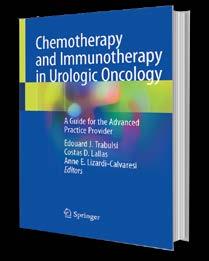
6 minute read
Philadelphia Prostate Cancer Biome Project Update
The Biome Project is moving our research program ahead.
By Shannon Fields, Philadelphia Prostate Cancer Biome Project Coordinator
In the fight against cancer, research is our most powerful weapon. Jefferson faculty at Sidney Kimmel Cancer Center (SKCC) have literally written the first book on prostate cancer for patients, and they are continuing to rewrite the medical literature with innovative research and new discoveries. The Philadelphia Prostate Cancer Biome Project (PPCBP) is the newest chapter supported through a major philanthropic gift from Sydney and Sharon Martin.
This project is a long-term, multi-disciplinary, multi-institutional collaboration that studies the region’s prostate-cancer biome, the biological-sociological-psychological ecosystem where it flourishes. The project partners with top cancer centers, hospitals, and universities in the Philadelphia region to collect and process biospecimens and patient/ population data. Patients are tracked over years to understand the many factors that predict outcomes in the prostate cancer biome. The data will be used to develop new strategies to prevent, diagnose, and treat the disease, leading to better outcomes for years to come. The Biome Project is supported by a major philanthropic gift. The overall direction of the program the responsibility of Dr. Kevin Kelly Director, Division of Solid Tumor Oncology and Associate Director of Clinical Research, SKCC and Dr. Leonard Gomella, Chair Department of Urology and Senior Director for Clinical Affairs, SKCC.
Pilot Program Award Success
Since launching in 2019, the Biome Project has funded 9 pilot awards in the clinical, basic, and population science arenas. Pilot funds have already been used to develop 3 other successful R0-1 grant applications. See page 36 for details on one specific example of how these pilot grants can lead to major NIH funding. To check out the some of these pilot projects and watch videos from the outstanding investigators behind them visit www.Jefferson. edu/givebiomeproject.
The Biome Project is proud to announce that three NIH RO1 grants were awarded to Jefferson researchers with preliminary data gathered through pilot projects funded by the Philadelphia Prostate Cancer Biome Project. advance prostate cancer, which will help target those mechanisms with potential future therapies. The lab is researching the role of the GATA2 signaling network in lethal prostate cancer. GATA2 has a key role in driving prostate cancer aggressiveness. This work has earned an NIH R01 award.
Veronica Rodriguez-Bravo, PhD, is investigating how aggressive tumors adapt and survive with high levels of chromosomal defects in order to find molecular vulnerabilities for therapeutic targeting. The Rodriguez-Bravo lab has been awarded an NIH R01 grant. The five-year R01 grant helps the lab continue to conduct impactful research, potentially developing several other Philadelphia Prostate Cancer Biome Project projects over time. Thenappan Chandrasekar, MD, and Sushil Kumar Tripathi, PhD, pilot awardees continued work discovered at Jefferson on the VPAC molecule in order to develop a simple and affordable test that uses only voided urine to detect prostate cancer. Dr. Mat Thakur, coinvestigator in this biome project, has recently been awarded an NIH R01 grant based on the foundations of this early research. This five-year NIH grant, with Dr. Edouard Trabulsi as Co-PI with clinical support from the Department of Urology, will substantiate preliminary Biome Project data through this new grant and allow the further refinements of this urinary-based prostate cancer test (see page 36).
Pilot Award Program
To further support investigators to make advancements against lethal prostate cancer, we have opened a Rolling Pilot Award Program in which new applications will be reviewed and awarded on a quarterly basis. This provides the best opportunity for researchers to receive much needed funding for promising prostate cancer pilot projects.
PILOT AWARD DETAILS:
The awards will be one (1) year in duration and will provide funding of $50,000 to $150,000 depending on the innovation of the application.
The principle Investigator needs to be a member of Jefferson University, SKCC or a SKCC consortium member. Co-investigators outside of Jefferson University\SKCC are strongly encouraged.
Funded Pilot Awardees are asked to submit 6-month and final progress reports.
Applications for the Pilot Awards will be accepted on a rolling basis. Submitted applications will enter a rolling review process to determine funding. APPLICATION REVIEW SCHEDULE (2021)
Reviews at Quarter End (deadline) Estimated Funding Date March 31, 2021 April 28, 2021 June 30, 2021 July 28, 2021 September 30, 2021 October 28, 2021 December 31, 2021 January 28, 2022
Contact Shannon Fields, Philadelphia Prostate Cancer Biome Project Coordinator, with any questions on the pilot award process at sxf068@jefferson.edu or 215-955-8875 or 407-430-6030.
Interested investigators can apply for PPCBP pilot award funding through the Jefferson InfoReady system: https://jefferson.infoready4.com/#competitionDetail/1817617
Prostate Whole Mount Project
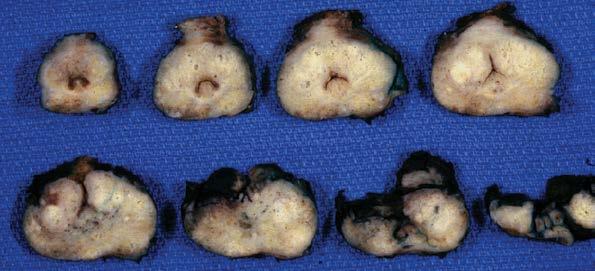
Example of a radical prostatectomy whole mount before embedding in wax.

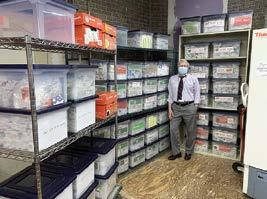
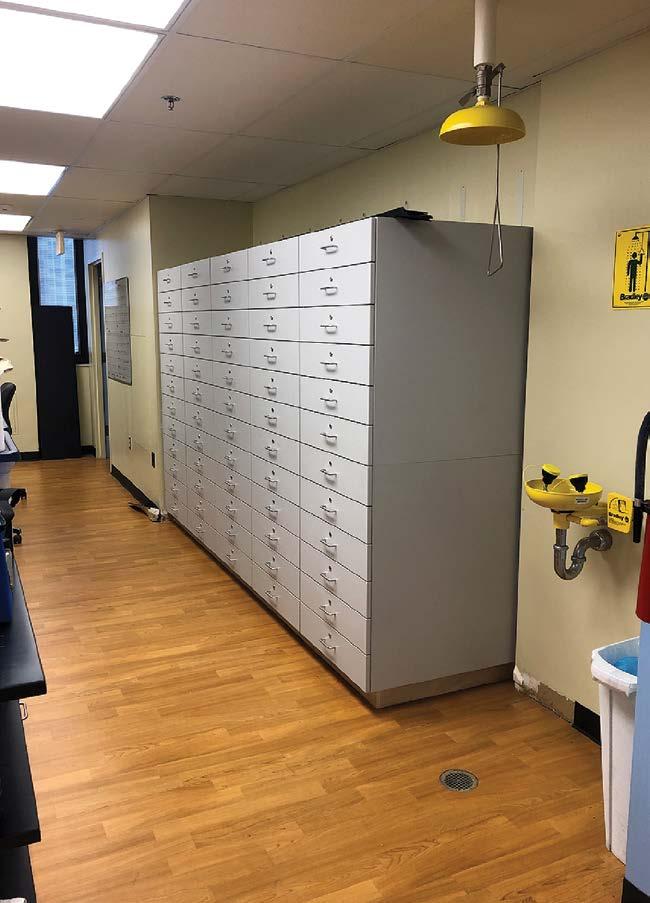
Inset Before: Dr. Peter McCue with the nearly 2,000 whole mounts in bins.
Background After: Newly renovated biorepository space to securely store the whole mount prostate specimens.

Urology CRNP Fatuma Doka has been overseeing the clinical chart retrieval associated with the nearly 2000 radical prostatectomy specimens.
As part of the PPCBP, the Sidney Kimmel Cancer Center Biorepository has acquired nearly 2,000 whole mount prostate specimens spanning from 1989 to 2009 under an IRB protocol. A whole mount (see page 33) is a process where by the entire radical prostatectomy specimen is cut into 5-10 individual slices (similar to an egg in an egg slicer).
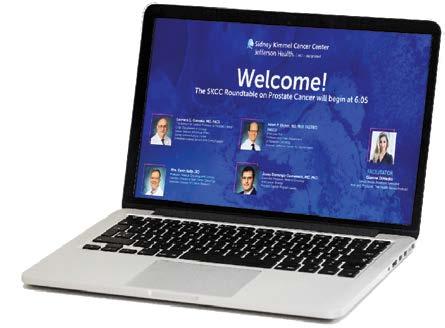
Each wax embedded slice allows the entire specimen to be available for future research efforts including diagnostic testing and drug development. Along with this project, archival medical records are being catalogued, deidentified and will be entered into an IRB compliant database to match the samples with clinical information. This is a powerful combination of carefully annotated pathology samples combined with highly detailed clinical information. The prostate whole mounts currently in bins, are being transferred and organized into specially designed drawer units. The SKCC Biorepository team along with Dr. Peter McCue in the Department of Pathology and members of the Department of Urology have been working for most of 2020 and into 2021 to organize and annotate this vast collection of prostate specimens and the associated clinical data. This truly one of a kind collection will open countless doors for prostate cancer research.
In the spring of 2020 members of the Prostate Cancer Biome Project addressed issues relating to the COVID-19 pandemic and answered audience questions on prostate cancer.
Prostate Cancer Virtual Symposia
The PPCBP team sponsored two virtual symposia over the last year, one in the spring (see graphic below) and the latest on November 11, 2020, moderated by Drs. Adam Dicker and Kevin Kelly. The recent program featured some of the recent pilot awardees who gave brief overviews of their research activities supported by the Biome Project. When viewing this program you can also learn about the inspiring story of prostate cancer survivor Erik Marrero, who shared his personal journey, including the benefits of yoga and mindfulness. You can watch the 2020 Advancements in Prostate Cancer symposium anytime or share it with family and friends: https://vimeo.com/480791144
For general information on the Philadelphia Prostate Cancer Biome Project visit: www.jefferson.edu/givebiomeproject
To learn more about how you can help support Philadelphia Prostate Cancer Biome Project please contact Emma Laverty, Assistant Vice President of Development at emma.laverty@ jefferson.edu or 215-503-8679.




